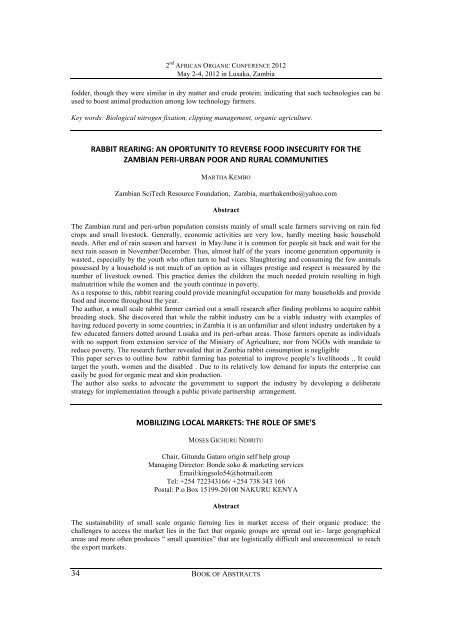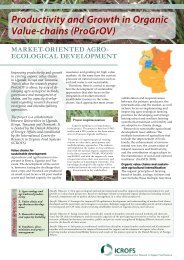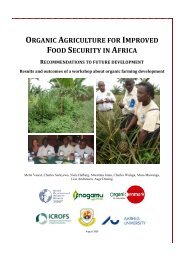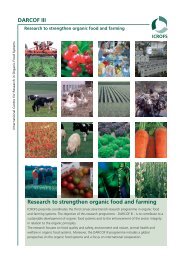The 2nd African Organic Conference â Mainstreaming ... - ICROFS
The 2nd African Organic Conference â Mainstreaming ... - ICROFS
The 2nd African Organic Conference â Mainstreaming ... - ICROFS
Create successful ePaper yourself
Turn your PDF publications into a flip-book with our unique Google optimized e-Paper software.
2 nd AFRICAN ORGANIC CONFERENCE 2012<br />
May 2-4, 2012 in Lusaka, Zambia<br />
fodder, though they were similar in dry matter and crude protein; indicating that such technologies can be<br />
used to boost animal production among low technology farmers.<br />
Key words: Biological nitrogen fixation, clipping management, organic agriculture.<br />
RABBIT&REARING:&AN&OPORTUNITY&TO&REVERSE&FOOD&INSECURITY&FOR&THE&&&<br />
ZAMBIAN&PERI:URBAN&POOR&AND&RURAL&COMMUNITIES&&<br />
MARTHA KEMBO<br />
Zambian SciTech Resource Foundation, Zambia, marthakembo@yahoo.com<br />
Abstract<br />
<strong>The</strong> Zambian rural and peri-urban population consists mainly of small scale farmers surviving on rain fed<br />
crops and small livestock. Generally, economic activities are very low, hardly meeting basic household<br />
needs. After end of rain season and harvest in May/June it is common for people sit back and wait for the<br />
next rain season in November/December. Thus, almost half of the years income generation opportunity is<br />
wasted., especially by the youth who often turn to bad vices. Slaughtering and consuming the few animals<br />
possessed by a household is not much of an option as in villages prestige and respect is measured by the<br />
number of livestock owned. This practice denies the children the much needed protein resulting in high<br />
malnutrition while the women and the youth continue in poverty.<br />
As a response to this, rabbit rearing could provide meaningful occupation for many households and provide<br />
food and income throughout the year.<br />
<strong>The</strong> author, a small scale rabbit farmer carried out a small research after finding problems to acquire rabbit<br />
breeding stock. She discovered that while the rabbit industry can be a viable industry with examples of<br />
having reduced poverty in some countries; in Zambia it is an unfamiliar and silent industry undertaken by a<br />
few educated farmers dotted around Lusaka and its peri-urban areas. Those farmers operate as individuals<br />
with no support from extension service of the Ministry of Agriculture, nor from NGOs with mandate to<br />
reduce poverty. <strong>The</strong> research further revealed that in Zambia rabbit consumption is negligible<br />
This paper serves to outline how rabbit farming has potential to improve people’s livelihoods .. It could<br />
target the youth, women and the disabled . Due to its relatively low demand for inputs the enterprise can<br />
easily be good for organic meat and skin production.<br />
<strong>The</strong> author also seeks to advocate the government to support the industry by developing a deliberate<br />
strategy for implementation through a public private partnership arrangement.<br />
MOBILIZING&LOCAL&MARKETS:&THE&ROLE&OF&SME'S&<br />
MOSES GICHURU NDIRITU<br />
Chair, Gitundu Gataro origin self help group<br />
Managing Director: Bonde soko & marketing services<br />
Email:kingsolo54@hotmail.com<br />
Tel: +254 722343166/ +254 738 343 166<br />
Postal: P.o Box 15199-20100 NAKURU KENYA<br />
Abstract<br />
<strong>The</strong> sustainability of small scale organic farming lies in market access of their organic produce: the<br />
challenges to access the market lies in the fact that organic groups are spread out ie:- large geographical<br />
areas and more often produces “ small quantities” that are logistically difficult and uneconomical to reach<br />
the export markets.<br />
34<br />
BOOK OF ABSTRACTS





